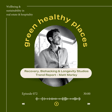
sustainable micro-cities in Latin America with Miraval Holdings
Welcome to episode 064 of the Green Healthy Places podcast in which we discuss the themes of wellbeing and sustainability in real estate and hospitality.
I’m your host Matt Morley and in this episode I’m talking to Gregorio Esteban, Founder of Miraval Holdings, a sustainable real estate developer committed to delivering high-quality, housing solutions for the Latin American market.
As you’ll see, they are also big on Environmental, Social and Governance issues, known as ESG, with a particular emphasis on the social angle, given that they have five projects currently in Colombia, each at different stages of planning, construction and delivery.
Colombia has an acute housing shortage, so Miraval aim to help plug that gap with sustainable middle-class housing.
- GUEST: Gregorio Esteban / https://www.miraval.com.co/
- HOST: Matt Morley / https://biofilico.com/



















